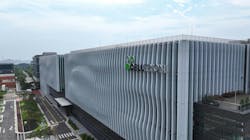Celltrion finalizes deal to acquire Lilly’s New Jersey biologics plant
Celltrion, South Korea’s largest manufacturer and exporter of biosimilars, in a letter to shareholders, said it has signed an agreement to acquire Eli Lilly’s biologics drug substance facility in Branchburg, New Jersey, marking a significant step in the South Korean company’s U.S. expansion and tariff mitigation strategy.
The 37-acre site includes four buildings and 10 acres of vacant land for future development. Celltrion valued the acquisition at approximately 460 billion KRW ($336 million), with total costs including operational funds expected to reach about 700 billion KRW ($503 million). The company said the deal, executed through its U.S. subsidiary, will allow it to commence operations immediately while retaining the facility’s existing workforce.
Celltrion expects it will take 12 to 18 months to validate the site before shifting production of its products to Branchburg. In the interim, existing contract manufacturing agreements at the facility will generate revenue and support a faster recovery of investment, according to the company. Localized production is also expected to reduce logistics costs for U.S.-bound shipments and lower reliance on external CMOs.
The acquisition follows a series of tariff preparedness measures, including stockpiling two years of inventory in the U.S. and expanding domestic CMO contracts. Once validated, the New Jersey plant will produce and supply Celltrion products directly to the U.S. market.
This update builds on prior reporting from Pharma Manufacturing, which noted in July that Celltrion had been designated the preferred bidder for a U.S.-based large-scale cGMP drug substance plant. At the time, the company described the move as a “fundamental solution” to mitigate future tariff-related risks. Celltrion also said the facility’s capacity would be up to 1.5 times larger than its second Songdo plant in South Korea, which currently produces 90,000 liters annually.
Celltrion has positioned the acquisition as a long-term response to evolving U.S. trade policies. The company said it expects to close the transaction by the end of 2025, subject to regulatory approvals.
